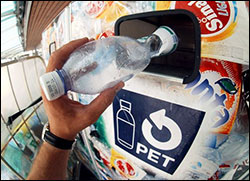
Consortium focuses on recycling shrink labels on PET bottles
KINGSPORT, TENN. -- Representatives from more than 30 companies have formed a consortium to talk about the challenges full-wrap shrink labels pose to PET bottle recycling and to find possible solutions.
The full-wrap label consortium, organized by Eastman Chemical Co, has members from a diverse group of companies, from resin producers to plastics recyclers.
Collaboration and cooperation will be  keys to finding a viable long-term solution that benefits everyone, said Holli Whitt, market development manager for sustainability for Eastman's specialty plastics division, in a phone interview.
keys to finding a viable long-term solution that benefits everyone, said Holli Whitt, market development manager for sustainability for Eastman's specialty plastics division, in a phone interview.
According to Eastman, about 80 percent of full-wrap labels in North America are on PET containers. The labels have become increasingly popular because they have a great shelf impact.
The labels pose challenges to PET bottle recycling, according to the National Association of PET Container Resources. Full-wrap labels interfere with auto-sorting equipment and are hard to remove during the pre-wash process. If the labels make it through pre-wash, they will likely also stay with the PET during the rest of the recycling process, leading to lower-quality recycled PET.
"There's truly not a silver bullet. There's not a single solution that's going to mitigate the different [challenges] of recycling PET," Whitt said.
The consortium is looking a combination of solutions. Ideas include adding perforations to labels to help them come off during normal baling processes and providing recycling facilities with de-labeling equipment.
The group has also considered making labels from materials that will float, an action promoted by the Association of Postconsumer Plastic Recyclers. PET flakes sink in a float/sink separation process, as do common shrink sleeve materials like polylactic acid or PVC. Using floatable labels will make separation easier.
The consortium aims to find a solution that works for all the companies involved – like film producers, equipment manufacturers, ink suppliers and label producers – as well as those involved in end-of-life issues, Whitt said.
"We want the best solution for recyclers," she added, but also for brand owners who want labels attract consumer attention.
"It's going to require a lot of people to make some changes and do things differently," she said.
Eastman, based in Kingsport, Tenn., founded the consortium in April 2012 after giving a presentation at a shrink label conference.
"We saw it as a gap in the industry. There wasn't a group of people established to look after the best interests of the industry. We decided to be a leader and pull that group together," Whitt said.
The consortium is still in the exploration stage, she said. It has met twice, in August and November 2012, and will have another meeting in February.
Membership is open to those involved in the PET bottle, full-wrap label value chain.
"We're looking for alternative perspectives and great ideas from people," Whitt added.